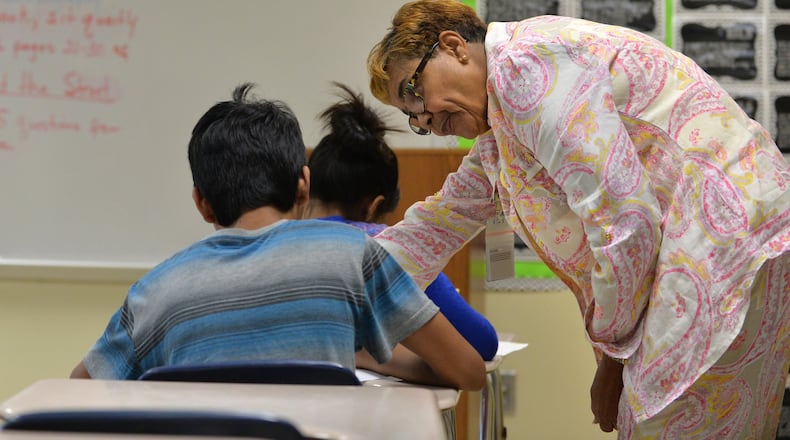Start-of-school teaching vacancies
DeKalb 140
Fulton 105
Cobb nearly 40
Atlanta Public Schools 9
Gwinnett 6
Fewer aspiring to teach
In Georgia, during the 2007-08 school year, 12,436 students received teaching certificates for the first time, according to the Georgia Professional Standards Commission. Two years later, the total fell to 8,520 and it has remained about the same each year since. During the 2008-09 school year, more than 7,200 people completed Georgia teacher-preparation programs, according to a federal report; three years later, 6,405. Nationally, there’s been a similar decline, federal data shows.
Georgia teacher pay
The average teacher salary in Georgia for 2013-14 was $52,924, compared to the national average, $56,610, according to the National Education Association. Georgia ranked 24th among states in its average teacher salary.
Thousands of metro Atlanta students are starting the school year with substitutes instead of permanent teachers as education leaders struggle to fill vacancies brought on by a shortage of teachers.
It was a different picture a few years ago during the recession when districts were making significant cuts in teaching positions amid budget constraints. Now many school systems are scrambling to fill teaching vacancies because fewer people are going into the profession, due in part to weak salaries and increased stress associated with the job amid more rigorous achievement standards.
Fulton County, for example, had about 40-50 vacancies at the start of school five years ago. Last year at this time the district had 65 teaching vacancies; as of the start of school this week it had 105, and the shrinking teacher supply increases competition to fill those slots.
It’s a scenario thousands of school districts are grappling with across the country, and the result can be hugely disruptive to classroom learning, with students in some instances getting substitutes who are not certified or don’t have adequate experience in subjects or grades they’re teaching. The largest number of vacancies are in math, science, special education and foreign languages.
“If we are placing people in classrooms, who are either not knowledgeable in their subject area and/or not prepared pedagogically to listen to and interact with kids, we’re going to do harm,” said Barbara Stengel, associate chairwoman for teacher education at Vanderbilt University.
“Everybody in their right mind knows what happens when you bring in substitute teachers. There’s chaos and it’s not just for the kids in that classroom for that period. It’s chaos that ripples through a team. It disrupts the day for everybody.”
Metro school district officials say the vast majority of their teaching and support personnel positions are filled by the start of school, but do acknowledge having the substitutes is not ideal. The five largest metro districts say they’re working to fill all the vacancies but don’t know exactly when that might happen.
“Right now we’re 98 percent staffed,” said Tekshia Ward-Smith, chief human resources officer for DeKalb schools. “While not ideal, it is certainly the best option to ensure our children receive the instruction they deserve.”
Ward-Smith says DeKalb has a roster of 550 certified retired substitute teachers. In addition to those, it also has about 500 substitutes who are non-certified, she said.
To address the teacher shortage, DeKalb education leaders say they plan to beef up recruitment efforts, forming close partnerships with teaching colleges that prepare future teachers. The district, which recently gave teachers up to a 4 percent salary increase, wants to also give teachers another pay boost in the next year or two to stay competitive with other metro districts, Ward-Smith said.
Other metro Atlanta school systems also gave teachers pay raises up to 8 percent or more beginning this fall, the biggest jump in years for many educators following furloughs, stagnant pay and increasing class sizes.
“Everybody is certainly out there trying to recruit the top talent, and we want to be right in the market,” Ward-Smith said.
“As we work diligently to fill vacancies, we have trained substitute personnel in the classrooms, and for long-term substitute assignments we require a college degree and often look to retired teachers for those assignments,” said Fulton schools spokeswoman Susan Hale in an emailed statement.
Like other districts, Fulton is giving teachers raises starting this fall. The district is also trying to recruit new and experienced teachers by using hiring bonuses and incentives to teach at harder-to-staff schools. Additionally, the student population continues to grow, which means the district needs more teachers each year, Hale said.
In Cobb, district leaders had planned to hire 100 new teachers for this coming fall as part of an effort to decrease class sizes, which had risen amid budget cuts and furloughs.
When asked for statewide teacher vacancy figures, Georgia education department officials said they do not track the information, which is left to individual districts to compile.
Fewer people are becoming teachers in Georgia and many other states, with large urban districts seeing the most vacancies.
With state funding and local property tax revenue on the rise in Georgia, school systems are choosing to put the extra money toward teachers’ and other employees’ pay. The raises are welcome news after nearly a decade of cuts from the state, though education leaders say the pay bumps are still not enough considering the pressure teachers face with increased accountability standards tied to standardized tests and responsibilities in the classroom.
“There’s been a systematic disrespecting of teachers over the last 10 years, since the implementation of No Child Left Behind,” Stengel said. “As we’ve focused more on test scores … teachers feel like they’re being told what to do rather than exerting professional judgment.”
About the Author
Keep Reading
The Latest
Featured



